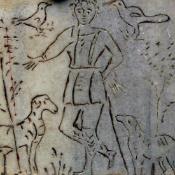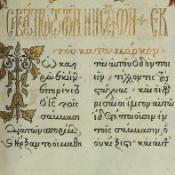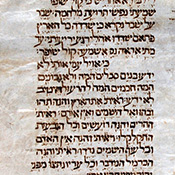Within the Classical Languages major you will have the opportunity to read and work with original-language texts of the Jewish, Classical, and Christian traditions. In addition to mastering the languages, you will learn to grasp challenging concepts, to ask significant questions and to seek answers to them, to develop original ideas, to become intellectually self-motivated, and to give great attention to accuracy in the use and interpretation of your languages.
You can begin the Classical Languages major as late as the fall of your junior year. This major is an attractive option even if you have no prior knowledge of the classical and biblical languages, but you are on track for graduate work in Classics, Biblical Studies, Early Christian Studies, or ministry. Many of our alumni have gone on to work in education, medicine, law, business, the military, the home, and other fields.
As a student of this major, you will achieve intermediate competency in two of the major’s languages (Hebrew, Greek, Latin) and concentrate in one of the two selected languages through 4 hrs of upper-division work, plus the capstone course.
Students with intermediate knowledge in Latin, Greek, or Hebrew prior to matriculation that is not departmentally approved transfer credit may, upon departmental approval, substitute for those 12 core hours any 12 hours of GREK, HEBR, or LATN course work, or any other departmentally approved hours.
Students who desire a still deeper grounding in the languages are encouraged to pursue an honors designation in Classical Languages. Read on, in the next tab, about the Classical Languages Honors Program for more detail.


 The pairing of Hebrew, Greek, and/or Latin with the study of art history allows you to grapple with both halves of the evidence from the ancient and pre-modern world. Ancient languages and texts provide a glimpse into the world of the ancients and give context for understanding art, both ancient and modern; meanwhile, the study of art provides real, concrete material that connects us directly with the past. In addition, European art draws heavily on the classical cultures of Greece and Rome. If you love studying history, art, and languages, this is the perfect major for you.
The pairing of Hebrew, Greek, and/or Latin with the study of art history allows you to grapple with both halves of the evidence from the ancient and pre-modern world. Ancient languages and texts provide a glimpse into the world of the ancients and give context for understanding art, both ancient and modern; meanwhile, the study of art provides real, concrete material that connects us directly with the past. In addition, European art draws heavily on the classical cultures of Greece and Rome. If you love studying history, art, and languages, this is the perfect major for you.  If you're interested in public speaking, debate, and rhetoric, this integrated major is for you. Public speaking and debate training, along with study of contemporary critical and theoretical sensibilities, will give you practical insight and a strengthened interpretive “feel” for reading ancient orators and theorists. This “feel” is a vital part of the training you'll need if you want to become a scholar interpreting ancient oratory and theory. Conversely, as a student and practitioner of modern rhetoric, you will learn a great deal from the ancient handbooks and models, which are best accessed in their original languages and contexts.
If you're interested in public speaking, debate, and rhetoric, this integrated major is for you. Public speaking and debate training, along with study of contemporary critical and theoretical sensibilities, will give you practical insight and a strengthened interpretive “feel” for reading ancient orators and theorists. This “feel” is a vital part of the training you'll need if you want to become a scholar interpreting ancient oratory and theory. Conversely, as a student and practitioner of modern rhetoric, you will learn a great deal from the ancient handbooks and models, which are best accessed in their original languages and contexts. This major is an excellent choice if you're interested in studying theology and/or the history of the early church. A foundation in Greek and/or Latin is both a natural complement and a catalyst to all serious study of early Christianity, as well as a key component of broader theological and historical studies. Early Christianity formed part of the cultural world within which the classical languages evolved.
This major is an excellent choice if you're interested in studying theology and/or the history of the early church. A foundation in Greek and/or Latin is both a natural complement and a catalyst to all serious study of early Christianity, as well as a key component of broader theological and historical studies. Early Christianity formed part of the cultural world within which the classical languages evolved. If you love languages and have an interest in teaching, this major is for you. The study of linguistics is a natural complement to all language learning, use, and instruction, and many students of the classical languages aspire to a career in primary or secondary education. Even if you don't teach one of the classical languages, the coursework will enhance your resume.
If you love languages and have an interest in teaching, this major is for you. The study of linguistics is a natural complement to all language learning, use, and instruction, and many students of the classical languages aspire to a career in primary or secondary education. Even if you don't teach one of the classical languages, the coursework will enhance your resume. The classical languages will give you unmediated access to the seminal texts of the 2800-year Western literary tradition. They provide a natural complement to the study of English literature, which, especially in its earlier texts, grew up in the tradition of forms, styles, and subjects of literature written in Hebrew, Latin, and Greek.
The classical languages will give you unmediated access to the seminal texts of the 2800-year Western literary tradition. They provide a natural complement to the study of English literature, which, especially in its earlier texts, grew up in the tradition of forms, styles, and subjects of literature written in Hebrew, Latin, and Greek. If you love learning languages, this major is for you. You will learn the history of both ancient and modern languages, as well as their linguistic similarities and differences. If you're planning to attend graduate school, future research interests may require both ancient and modern languages. And whether you plan to pursue a career in business, finance, medicine, law, international relations, politics, or many other fields, study of modern and classical languages will be a significant enhancement to your resume.
If you love learning languages, this major is for you. You will learn the history of both ancient and modern languages, as well as their linguistic similarities and differences. If you're planning to attend graduate school, future research interests may require both ancient and modern languages. And whether you plan to pursue a career in business, finance, medicine, law, international relations, politics, or many other fields, study of modern and classical languages will be a significant enhancement to your resume. This integrated major is ideal if you're also interested in studying philosophy. The discipline of philosophy has its roots in Greek and Roman thought, and those who study philosophy find knowledge of the classical languages extremely useful as they interpret the works of those early Greco-Roman philosophers. This integrated major would also provide a strong complementary foundation if you are pursuing an education in contemporary analytic or continental philosophy.
This integrated major is ideal if you're also interested in studying philosophy. The discipline of philosophy has its roots in Greek and Roman thought, and those who study philosophy find knowledge of the classical languages extremely useful as they interpret the works of those early Greco-Roman philosophers. This integrated major would also provide a strong complementary foundation if you are pursuing an education in contemporary analytic or continental philosophy. The Biblical and Theological Studies courses selected for this integrated major bear on the history, culture, and literature of ancient Greek, and the study of Greek facilitates greater depth of work in the field of biblical and theological studies. This major will be an attractive option if you plan to advance to graduate work or directly into ministry, but the original language work is of more a supplement than your primary interest.
The Biblical and Theological Studies courses selected for this integrated major bear on the history, culture, and literature of ancient Greek, and the study of Greek facilitates greater depth of work in the field of biblical and theological studies. This major will be an attractive option if you plan to advance to graduate work or directly into ministry, but the original language work is of more a supplement than your primary interest. This major is designed for students who wish to study the Bible in the original languages. It is ideal if you are planning to advance to graduate studies or directly into vocational ministry and wish to begin original-language study immediately, rather than deferring it to graduate school (as is often required as the de facto result of limited undergraduate offerings in Hebrew and Greek). This major will also prepare you well for careers in editing, publishing, Bible translation, and education.
This major is designed for students who wish to study the Bible in the original languages. It is ideal if you are planning to advance to graduate studies or directly into vocational ministry and wish to begin original-language study immediately, rather than deferring it to graduate school (as is often required as the de facto result of limited undergraduate offerings in Hebrew and Greek). This major will also prepare you well for careers in editing, publishing, Bible translation, and education. This integrated major is an option, in exceptional cases only, if you want to integrate your field of study with the classical languages major, but your field of interest is not represented by the other pre-existing integrated programs. This program can provide a special opportunity for new programs of study in which you would collaborate with your advisor and the CL language section coordinator (with department chair oversight) to create a unique and rich path of study.
This integrated major is an option, in exceptional cases only, if you want to integrate your field of study with the classical languages major, but your field of interest is not represented by the other pre-existing integrated programs. This program can provide a special opportunity for new programs of study in which you would collaborate with your advisor and the CL language section coordinator (with department chair oversight) to create a unique and rich path of study.